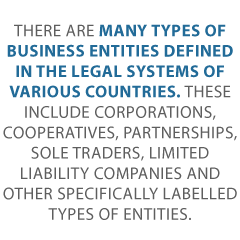What is a Business Entity?
A business entity is a commercial, corporate and/or other institution. It is formed and administered per commercial law to engage in business activities. So this is often for the sale of a product or a service. Basically, an entity is what allows you the ability by law to conduct business.
The legal systems of various countries define many types of business entities. These include corporations, cooperatives, partnerships, sole traders, limited liability companies and other specific types of entities. Each country has its own type of entities to file for so a company can open and operate.
The Sole Proprietorship Business Entity
A Sole Proprietorship is a business consisting of a single owner. There is no separate business form. Other names for it are sole trader or just a proprietorship. One individual or one legal person (e.g. corporation, LLC) owns and runs such a business entity. Plus, there is no legal distinction between owner and business. Basically, the person IS the business.
The owner gets all profits (subject to taxation specific to the business). The owner has 100% responsibility for all losses and debts. And the proprietor owns every asset of the business. All debts of the business are the proprietor’s. It is a “sole” proprietorship in contrast with partnerships (which have at least two owners). With a sole proprietor YOU are liable for your business debts because YOU are the business.
The Partnership Business Entity
A General Partnership is a partnership where all the partners are jointly liable for the debts of the partnership. Here, the partners share equally in responsibility and liability. Liability for business debts is like a sole proprietorship. But there are multiple partners, not just one person.
The assets of the business are owned on behalf of the partners. And they are each personally liable jointly for business debts, taxes and liability. For example, if a partnership defaults on a payment to a creditor, the partners’ personal assets are subject to attachment and liquidation to pay the creditor.
By default, partners have equal shares in the profits. But a partnership agreement will almost invariably expressly provide for how to share profits and losses. Each general partner is an agent of the partnership. Therefore, if that partner is apparently carrying on partnership business, all general partners can be held liable for his dealings with third persons.
The Limited Partnership Business Entity
A Limited Partnership is a partnership where at least one partner has unlimited liability and one or more partners have limited liability. A limited partnership is similar to a general partnership, except that in addition to one or more general partners (GPs) there are one or more limited partners. It is a partnership where only one partner must be a general partner.
Like shareholders in a corporation, limited partners have limited liability. This means they have no management authority. And they are only liable on debts the firm has incurred to the extent of their registered investment.
The general partners pay the limited partners a return on their investment (similar to a dividend). The partnership agreement often spells out its nature and extent. General partners thus carry more liability, and in cases of financial loss, the general partners will be the ones which are liable. Limited partnerships are distinct from limited liability partnerships, where all partners have limited liability. In some jurisdictions, the limited liability of the limited partners is contingent on their not participating in management.
The Limited Liability Partnership Business Entity
A Limited Liability Partnership is a partnership where a partner’s liability for the debts of the partnership is limited except in the case of liability for acts of professional negligence or malpractice. In some states, you can only form LLPs for purposes of practicing a licensed profession. So this is often attorneys, accountants and architects. This is often the only form of limited partnership allowed for law firms (versus general partnerships).
A limited liability partnership (LLP) is a partnership where some or all partners (depending on the jurisdiction) have limited liabilities. It, therefore, exhibits elements of partnerships and corporations. In an LLP, one partner is not responsible or liable for another partner’s misconduct or negligence. This is an important difference from the traditional unlimited partnership, where each partner has joint liability. So in an LLP, some partners have a form of limited liability similar to that of the shareholders of a corporation.
Get our business credit building checklist and build business credit the fast and easy way.
The Limited Liability Limited Partnership Business Entity
A Limited Liability Limited Partnership is a combination of LP and LLP, available in some states. The limited liability limited partnership (LLLP) is a relatively new modification of the limited partnership. So an LLLP is a limited partnership. It consists of one or more general partners and one or more limited partners. The general partners manage the LLLP, while often the limited partners only have a financial interest.
The difference between an LLLP and a traditional limited partnership lies in the general partner’s liability for the limited partnership’s debts and obligations. In a traditional limited partnership the general partners are jointly liable for its debts and obligations. And limited partners are not liable beyond the amount of their capital contributions.
The Limited Liability Company Business Entity
A Limited Liability Company (LLC) is a form of business whose owners enjoy limited liability. But it is not a corporation. A limited liability company is a flexible form of enterprise. It blends elements of partnership and corporate structures. An LLC is not a corporation. It is a legal form of company that provides limited liability to its owners. LLCs do not need to be organized for profit.
In certain US states, businesses that provide professional services requiring a state professional license may not be allowed to form an LLC. These can be legal or medical services. Rather they may have to form a very similar entity called a Professional Limited Liability Company (PLLC).
A limited liability company (LLC) is a hybrid business entity. It has certain characteristics of a corporation and a partnership or sole proprietorship. This depends on how many owners there are. An LLC, although a business entity, is a type of unincorporated association and is not a corporation.
The primary characteristic an LLC shares with a corporation is limited liability. And the main characteristic it shares with a partnership is the availability of pass-through income taxation. It is often more flexible than a corporation. And it is a great choice for companies with a single owner.
Get our business credit building checklist and build business credit the fast and easy way.
The Corporation Business Entity
A corporation is a separate legal entity incorporated directly through legislation or a legal registration process. Incorporated entities have legal rights and liabilities that are distinct from their employees, shareholders, and members. And they may conduct business as either a profit-seeking business or not for profit. Despite not being human beings, corporations, per the law, are legal persons. Hence they have many of the same rights and responsibilities as natural persons.
A corporation may be a Sub chapter S Corporation or a C corporation. An S corporation makes a valid election to pay taxes under Sub chapter S of Chapter 1 of the Internal Revenue Code. In general, S corporations do not pay any federal income taxes. Instead, the corporation’s income or losses divide among and pass through to its shareholders. The shareholders must then report the income or loss on their own individual income tax returns.
The S Corporation Business Entity
S corporations pass corporate income, losses, deductions, and credit through to their shareholders for federal tax purposes. S status combines the legal environment of C corporations with U.S. federal income taxation similar to that of partnerships. Like a C corporation, an S corporation is often a corporation under the law of the state where the entity is organized.
Taxation of S corporations resembles that of partnerships. As with partnerships, the income, deductions, and tax credits of an S corporation flow through to shareholders annually. So this is regardless of whether there are any distributions made. Thus, income taxes are at the shareholder level and not at the corporate level.
The C Corporation Business Entity
C corporation refers to any corporation paying taxes separately from its owners. The C corporation differs from an S Corporation, which generally does not pay separate taxes. Most major companies (and many smaller companies) get treatment like C corporations for US federal income tax purposes.
Professional corporations are those corporate entities for which many corporation statutes make special provision. So this is for regulating the use of the corporate form by licensed professionals such as attorneys, architects, engineers, public accountants, and physicians. Legal regulations applying to professional corporations often differ in important ways from those applying to other corporations.
Get our business credit building checklist and build business credit the fast and easy way.
The DBA (Not a Business Entity)
Doing Business As (DBA) denotes where a person or entity uses a business name differing from the person’s or entity’s true name. Filing rudiments vary and are not permitted for some types of businesses or professional practices. DBAs can be sole proprietorships or corporate entities can use them to reserve brand names. Such as those of chain stores where a holding company or other umbrella company owns and operates them.
The phrase “doing business as” (DBA, dba, d.b.a. or d/b/a) is an American and Canadian legal term. So it means the trade name or fictitious business name is not the legal name of the legal person(s) who owns the business and is responsible for it.
Choosing the best entity for your business is essential to get the best tax benefits while reducing your personal liability.

